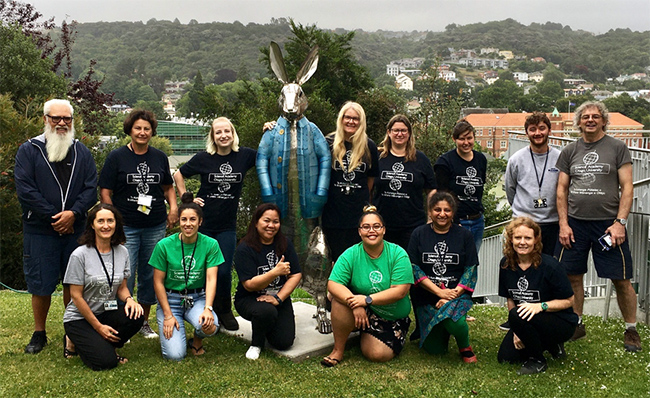
Teachers and University staff of the Science Academy 2020 January teachers' camp.
Summer Teacher Workshops
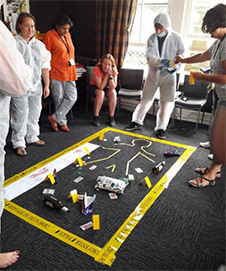
Forensic science 'crime scene' activity.
The withdrawal of the Ministry of Education financial support for the Science Academy (OUASSA) and its Teacher Professional Development Programme this year has meant we are only able to run one Workshop in 2020 and unable to fund teacher travel to Dunedin. The impact of this was a drop in participation from our usual 15-21 teachers from rural/provincial schools across the North and South islands to just nine, with all but one coming from the South Island.
During a pleasingly warm Dunedin week, our nine science teachers attended one of two streams, either the General Science or a Marine Science programme, with all coming together for Monday night and Thursday morning sessions (see timetables below).
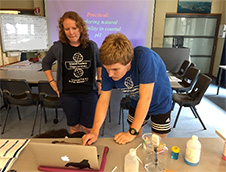
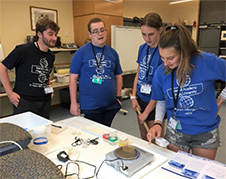
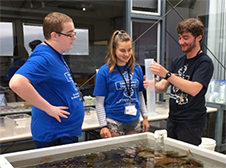
Teachers and students at the Portobello Marine Science classroom.
On the first evening, all teachers participated in a mock crime scene activity with staff from Forensic Analytical Science. The focus was on finding and analysing evidence such as fingerprints, footprints, DNA samples and unknown chemical substances. The teachers found the session very engaging and hoped to run similar activities back at their schools.
Our three teachers who attended the Marine Science programme at Portobello focused on how to teach students about ocean acidification in a practical, engaging way. The simple experiments that they were shown could be repeated in any science classroom, giving students a clear insight into how oceans are affected by increasing CO2 concentrations and decreasing pH levels.
On the second day, teachers were put to the test when 11 students from our Summer Camp joined them to trial the experiments. All three teachers enjoyed being able to put into action what they had just learnt and how to link it to multiple strands of the NZ Curriculum.
The six teachers who participated in the General Science programme went along to the School of Physical Education & Sports Science on the second day to participate in Sport and Exercise Science relevant to junior school students.
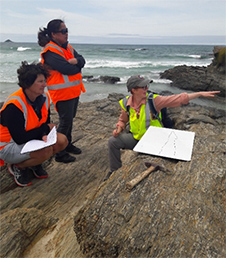
Teachers learn about coastal geology with Sophie Briggs
Next was a field trip to some of Dunedin's beaches with the Geology department, looking at coastal Otago rocks and discussing formation processes, as well as how to integrate Geology into the junior Science curriculum. A highlight was when the Otago Daily Times turned up with a reporter and film crew.
See the footage in the ODT article
The third day of the General Science PLD programme included three different options covering aspects of Physics, Genetics or Chemistry. Teachers enjoyed working in small groups with university staff and being able to tailor each session to their particular areas of interest. In Chemistry they practised carrying out titrations for Level 2/3 internal assessments.
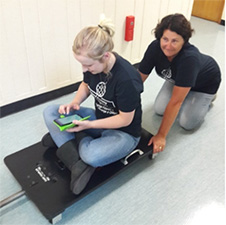
Physics lab photos - using crash trolleys to measure collisions.
During the Physics session, the teachers tested out some applications which turn mobile phones into data-gathering powerhouses, then investigated collisions using crash trolleys. Over in the Genetics lab, they ran samples of bacterial DNA through gel electrophoresis and practised setting up gels using micro-pipettes. Lastly everyone attended a session where they met a team of Physics staff who are developing a Level 3 Physics assessment task in both te reo Maori and English.
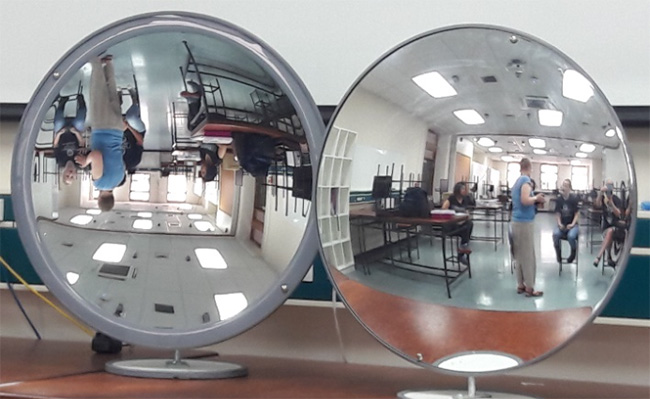
All of the sessions were very well received and left the teachers feeling excited about all the new activities they can now do with their students. The final morning workshop was spent sharing resources and discussing ways to integrate their new knowledge into future teaching plans.
Quotes from teachers:
“The workshops were relevant and engaging - very inspiring and excellent role models for classroom teaching.”“It was so helpful that the teacher participants got together at the end and shared resources to use in the classroom….. I hope this event [will] be continued with funding and invite beginner teachers like me, who also came from another country.”